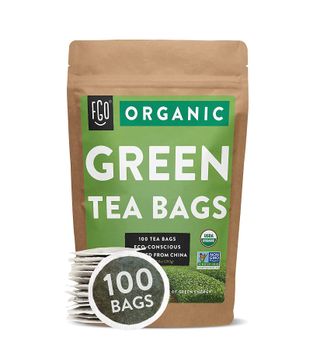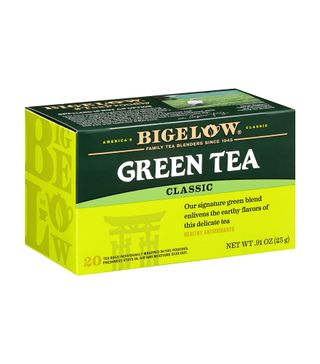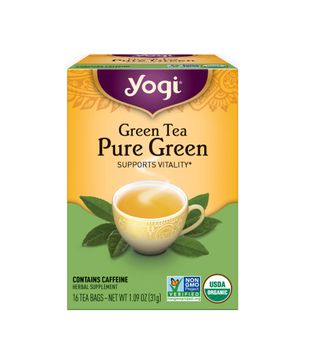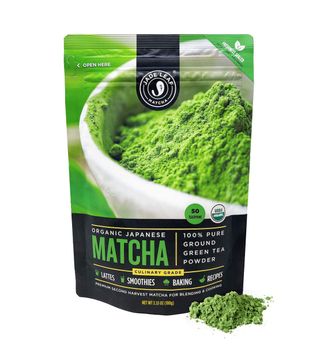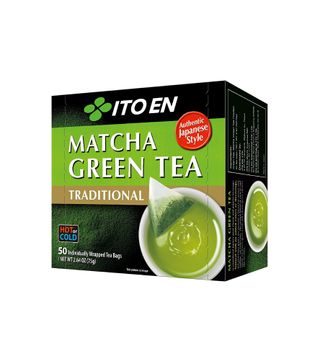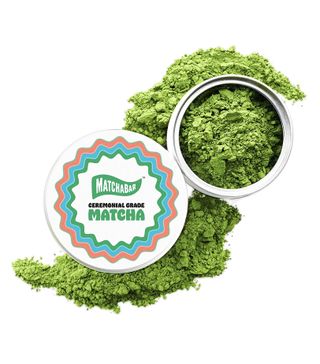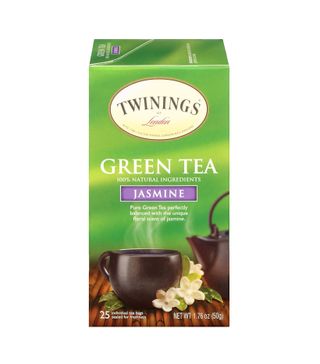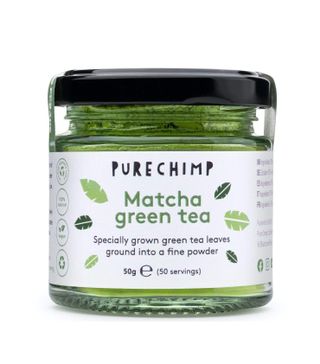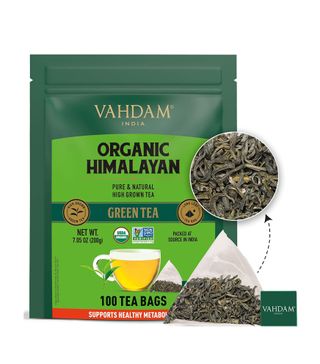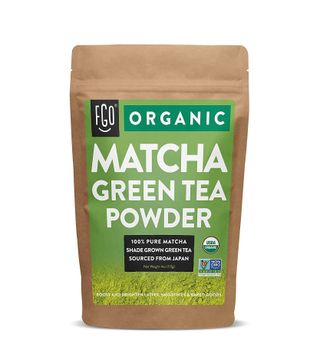It's Official: Green Tea Is Basically a Miracle Health Beverage


Green tea, just like other superfoods (or should we say super-beverages?) has quietly existed for centuries. And kale is another example, as it's been on this great green earth for a while now. How about quinoa? Well, they're not kidding when they call it an "ancient grain." The same goes for açai berries, cacao, and more. It's just recently—we're speaking relatively here—that the wellness world has caught on to their scientific health benefits.
But let's get back to green tea, specifically. We're deeming it a "super-beverage" for a reason. Various studies and experts say it benefits the body in myriad ways—whether that's protecting our organs, keeping sickness at bay, or slowing the aging process, to name a few. Keep scrolling to see all 10 of the ways that green tea can benefit the body, according to three different nutrition and medical experts.
1. It's Anti-Inflammatory

It's a common belief that many of our health concerns result from some form of underlying inflammation in the body (illness, headaches, joint pain, bloating, and heart disease among them). This might be why the word "anti-inflammatory" has become something of a buzzword in the wellness industry, prompting us to focus on consuming healthier food and drinks, like green tea, in order to boost our health from the inside out.
Green tea happens to be an anti-inflammatory superpower, thanks to its high antioxidant content. According to Dana James, MS, CDN, CNS, and founder of Food Coach NY, "Antioxidants bind up free radicals, which are not only from toxins but also from metabolic processes in the body such as the creation of energy." She explains that when our antioxidant levels are low, our cellular processes are inhibited, which results in "less energy and more inflammation." Studies support this. One, in particular, found that green tea suppresses the action of inflammation-related enzymes in the body.
2. It Regulates Blood Sugar

As we know, stable blood sugar means more consistent levels of energy throughout the day as well as a quicker metabolism (which, let's be real, can benefit all of us). This is especially beneficial, though, for people who suffer from insulin-related diseases. "Green tea may help to regulate blood sugar levels and increase insulin sensitivity, which may help to improve type 2 diabetes," says Amy Shapiro, MS, RD, CDN, registered dietitian and nutritionist and founder of Real Food NYC.
3. It Aids in Weight Loss
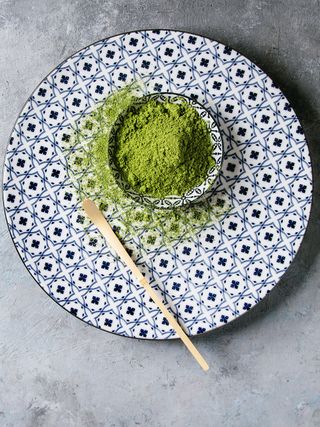
Drinking green tea can also promote healthy weight loss. Jennifer Haythe, MD, cardiologist and associate professor of medicine at Columbia University Medical Center, references one study in particular that "showed ingestion of green tea may increase insulin sensitivity and improve fat oxidation with exercise."
It's also worth noting that green tea is essentially leaf-infused water, meaning it's hydrating to the body. And anything that's hydrating can have positive effects on metabolism and body weight.
4. It Protects the Brain

Haythe also cites research on the neuroprotective qualities of green tea. It all goes back to its antioxidant content, specifically a class of flavonoids called catechins. "Several studies have shown that catechin-containing compounds stabilize and protect neurons, leading some scientists to believe it may protect against Alzheimer's and other forms of dementia," she says. That's probably why green tea is recommended as an integral part of a healthy brain diet.
5. It's Anti-Aging
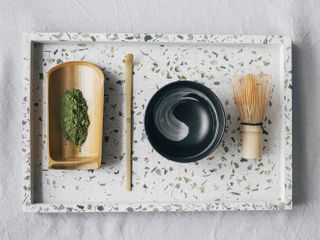
In the eternal quest for the fountain of youth, is it possible we've overlooked the humble cup of green tea? Maybe. According to James, we have green tea's antioxidants to thank for our cellular youth. "Antioxidants bind up free radicals, which are not only from toxins but also from metabolic processes in the body, such as the creation of energy," she says. "When our antioxidant levels are low, we age faster."
Here's the kicker: We don't just age faster in regards to wrinkles and fine lines, but we age faster in regards to cellular functionality. "The most well-researched [antioxidant] is epigallocatechin gallate (EGCG) and its influence on weight loss, but there are other antioxidants such as catechin, epicatechin, and proanthocyanidins, which help protect the cells from free radical damage," James says.
6. It Benefits the Heart
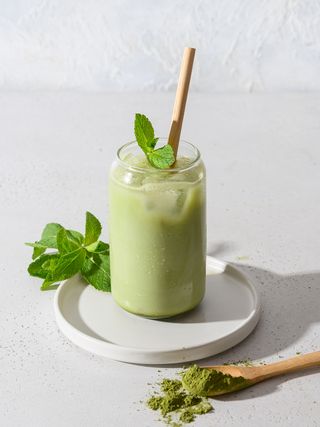
According to Haythe, green tea doesn't stop any of its beneficial effects on our brain. It can also positively impact our heart health. "A 2012 Japanese study showed that adults who consumed five cups of green tea or more a day had a 26% lower risk of death from heart attack or stroke than people who had less than one cup a day," she says.
7. It Protects the Skin

Remember how we said that green tea can prevent certain diseases and illnesses? That includes those that affect your largest organ: the skin. One study found that polyphenols derived from green tea can prevent, slow, and even reverse skin damage brought on by different environmental factors—especially UVB rays. In other words, for optimal skin health, we'll be sure to slather on our SPF, treat ourselves to some shade, and sip on a cup of green tea.
8. It Boosts Energy

Just like coffee, green tea contains caffeine, which is useful for increasing function and focus on sluggish mornings. But unlike coffee, this tea is way "less adrenaline-spiking than coffee," according to Shapiro. This is due to a combination of caffeine and L-theanine. When they work together, as they do in green tea, they "increase brain function without the jitters."
This is also why many people recommend that anxiety sufferers drink tea as opposed to coffee if they're set on a caffeine kick. The effect is more subtle and less anxiety-inducing than that from a latte or cappuccino would be.
9. It Has Antibacterial Qualities

Would you believe it if we said green tea could even help you out at your next dental checkup? Or that it might resist bacteria that could cause certain illnesses like the flu? According to Shapiro, it's absolutely true. "The catechins in green tea are antibacterial, which kill bad breath [germs] as well as many illnesses, like the common cold," she says.
10. It Might Prevent Cancer
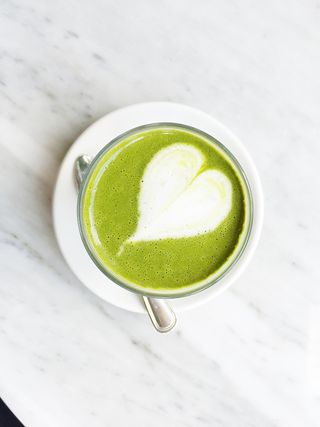
While much of the data is considered inadequate or inconclusive, several studies have shown that regular consumption of green tea may lead to a reduced rate of breast, prostate, and colorectal cancers," Haythe says. She notes that further research is needed to substantiate these studies, though they are promising.
Again, it all goes back to those famous green tea antioxidants. "Antioxidants are agents that prevent disease and aging," Shapiro says. "Most antioxidants are found in plant-based foods like fruits and veggies. Tea leaves also are rich in antioxidants. Drinking tea is an easy way to meet these goals especially for people who do not eat enough fruits and veggies."
Next: This Is What Happens to Your Body When You Start Drinking Matcha
This article was originally published at an earlier date and has since been updated.
Disclaimer
This article is provided for informational purposes only and is not intended to be used in the place of advice of your physician or other medical professionals. You should always consult with your doctor or healthcare provider first with any health-related questions.

Kaitlyn McLintock is an Associate Beauty Editor at Who What Wear. Although she covers a wide range of topics across a variety of categories, she specializes in celebrity interviews and skincare and wellness content. Having lived in Los Angeles and Austin, Texas, she recently relocated back to her home state of Michigan where she works remotely. Prior to Who What Wear, she freelanced for a variety of industry-leading digital publications, including InStyle, The Zoe Report, Bustle, Hello Giggles, and Coveteur. Before that, she held a long-term internship and subsequent contributor position at Byrdie. When she's not writing, researching, or testing the latest and greatest beauty products, she's working her way through an ever-growing book collection, swimming in the Great Lakes, or spending time with family.
-
 I Only Ate Sakara Life Meals for 30 Days—Here Are 7 Things That Happened
I Only Ate Sakara Life Meals for 30 Days—Here Are 7 Things That HappenedThe brand's 30-Day Fall Reset is finally here.
By Erin Jahns
-
 The 6 Warning Signs You're Not Getting Enough Protein
The 6 Warning Signs You're Not Getting Enough ProteinAnd what to eat to up your intake.
By Sarah Yang
-
 Everything This Professional Ballet Dancer Eats to Fuel Her For Performances
Everything This Professional Ballet Dancer Eats to Fuel Her For PerformancesHer grocery staples include high-quality French butter.
By Candice Aman
-
 These 8 Foods Are the Worst for Rosacea—Here's What to Eat Instead
These 8 Foods Are the Worst for Rosacea—Here's What to Eat InsteadControl those flare-ups.
By Sarah Yang
-
 15 Things That Cause Bloating and How to Get Rid of It ASAP
15 Things That Cause Bloating and How to Get Rid of It ASAPTry these.
By Sarah Yang
-
 Is the Alkaline Diet Overhyped? What Experts Want You to Know
Is the Alkaline Diet Overhyped? What Experts Want You to KnowHere's how it works.
By Sarah Yang
-
 I'm an Imperfect Dietitian and My Key to Eating Healthy Meals Is Convenience
I'm an Imperfect Dietitian and My Key to Eating Healthy Meals Is ConvenienceTake a peek at my weekly grocery staples.
By Candice Aman
-
 Avoid These 6 Foods—They'll Wreck Your Gut Health
Avoid These 6 Foods—They'll Wreck Your Gut HealthWhat to eat instead.
By Sarah Yang
